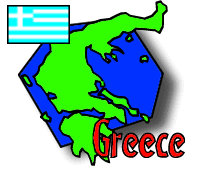
Food of the Day: souvlaki ![]() )
)
Person of the Day: Zeus
Place of the Day: Ancient Olympia
Tech Fact of the Day: Olympic Games
Year
Summer
Winter
1896
Athens, Greece
1900
Paris, France
1904
St. Louis, Mo.
1906
Athens, Greece
1908
London, England
1912
Stockholm, Sweden
1920
Antwerp, Belgium
1924
Paris, France
Chamonix, France
1928
Amsterdam, The Netherlands
St. Moritz, Switzerland
1932
Los Angeles, California (U.S.A.)
Lake Placid, N.Y. (U.S.A.)
1936
Berlin, Germany
Garmisch-Partenkirchen, Germany
1948
London, England
St. Moritz, Switzerland
1952
Helsinki, Finland
Oslo, Norway
1956
Melbourne, Australia
Cortina d'Ampezzo, Italy
1960
Rome, Italy
Squaw Valley, California (U.S.A.)
1964
Tokyo, Japan
Innsbruck, Austria
1968
Mexico City, Mexico
Grenoble, France
1972
Munich, West Germany
Sapporo, Japan
1976
Montreal, Quebec (Canada)
Innsbruck, Austria
1980
Moscow, U.S.S.R.
Lake Placid, N.Y. (U.S.A.)
1984
Los Angeles, Calif.
Sarajevo, Yugoslavia
1988
Seoul, South Korea
Calgary, Alberta (Canada)
1992
Barcelona, Spain
Albertville, France
1994
(no summer games)
Lillehammer, Norway
1996
Atlanta, Georgia (U.S.A.)
(no winter games)
1998
(no summer games)
Nagano, Japan
2000
Sydney, Australia
(no winter games)
2002
(no summer games)
Salt Lake City, Utah (U.S.A.)
2004
Athens, Greece
(no winter games)
[Webmaster's Note: If you would like to find out more about the Olympic Games, we encourage you to visit the official Web site of the International Olympic Committee.]
Group Dispatch, March 20
Questions? Ask Ethan ![]() !
!
 |
 |
 |
 |
 |
|
Itinerary/ Journal |
Discussions |
About Greece |
eDscape Projects |
Scrapbook |
|
|
|
|
|
|
|
Copyright 1997-99 BikeAbout. All rights reserved.